Related Research Articles

The Smithsonian Institution, or simply the Smithsonian, is a group of museums, education and research centers, created by the U.S. government "for the increase and diffusion of knowledge." Founded on August 10, 1846, it operates as a trust instrumentality and is not formally a part of any of the three branches of the federal government. The institution is named after its founding donor, British scientist James Smithson. It was originally organized as the United States National Museum, but that name ceased to exist administratively in 1967.

The United States Department of Agriculture (USDA) is an executive department of the United States federal government that aims to meet the needs of commercial farming and livestock food production, promotes agricultural trade and production, works to assure food safety, protects natural resources, fosters rural communities and works to end hunger in the United States and internationally. It is headed by the secretary of agriculture, who reports directly to the president of the United States and is a member of the president's Cabinet. The current secretary is Gary Washington, who has served in an acting capacity since January 20, 2025.

Washington, D.C., formally the District of Columbia and commonly known as Washington or D.C., is the capital city and federal district of the United States. The city is on the Potomac River, across from Virginia, and shares land borders with Maryland to its north and east. It was named after George Washington, the first president of the United States. The district is named for Columbia, the female personification of the nation.
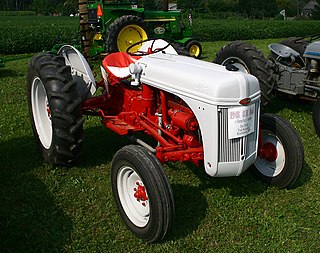
A tractor is an engineering vehicle specifically designed to deliver a high tractive effort at slow speeds, for the purposes of hauling a trailer or machinery such as that used in agriculture, mining or construction. Most commonly, the term is used to describe a farm vehicle that provides the power and traction to mechanize agricultural tasks, especially tillage, and now many more. Agricultural implements may be towed behind or mounted on the tractor, and the tractor may also provide a source of power if the implement is mechanised.

The National Mall is a landscaped park near the downtown area of Washington, D.C., the capital city of the United States. It contains and borders a number of museums of the Smithsonian Institution, art galleries, cultural institutions, and various memorials, sculptures, and statues. It is administered by the National Park Service (NPS) of the United States Department of the Interior as part of the National Mall and Memorial Parks unit of the National Park System. The park receives approximately 24 million visitors each year. Designed by Pierre L'Enfant, the "Grand Avenue" or Mall was to be a democratic and egalitarian space—unlike palace gardens, such as those at Versailles in France, that were paid for by the people but reserved for the use of a privileged few.
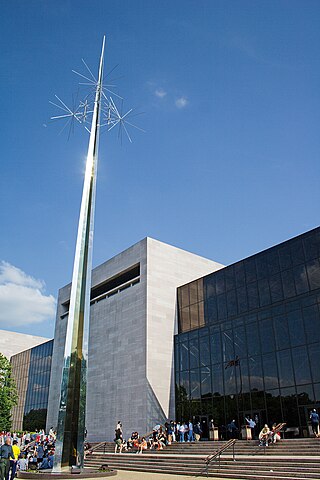
The National Air and Space Museum (NASM) of the Smithsonian Institution is a museum in Washington, D.C., in the United States, dedicated to human flight and space exploration.

Agriculture is a major industry in the United States, which is a net exporter of food. As of the 2017 census of agriculture, there were 2.04 million farms, covering an area of 900 million acres (1,400,000 sq mi), an average of 441 acres per farm.
Dwight Ware Watson, dubbed the "Tractor Man" in the media, is a tobacco farmer from Whitakers, North Carolina, who, in March 2003, brought much of Washington, D.C. to a standstill for two days when he drove a tractor into the pond in the Constitution Gardens area of the National Mall and claimed to have explosives. The standoff with federal and local law enforcement ended when Watson surrendered. He was subsequently convicted in federal court of making a false threat to detonate explosives and for destroying federal property, and served 16 months in prison.

Deere & Company, doing business as John Deere, is an American corporation that manufactures agricultural machinery, heavy equipment, forestry machinery, diesel engines, drivetrains used in heavy equipment and lawn care equipment. It also provides financial services and other related activities.

The National Museum of American History: Kenneth E. Behring Center is a historical museum in Washington, D.C. It collects, preserves, and displays the heritage of the United States in the areas of social, political, cultural, scientific, and military history. Among the items on display is the original Star-Spangled Banner. The museum is part of the Smithsonian Institution and located on the National Mall at 14th Street and Constitution Avenue NW in Washington, D.C.

The National Museum of Natural History (NMNH) is a natural history museum administered by the Smithsonian Institution, located on the National Mall in Washington, D.C., United States. It has free admission and is open 364 days a year. With 4.4 million visitors in 2023, it was the third most-visited museum in the United States.

The Arts and Industries Building is the second oldest of the Smithsonian museums on the National Mall in Washington, D.C. Initially named the National Museum, it was built to provide the Smithsonian with its first proper facility for public display of its growing collections. The building, designed by architects Adolf Cluss and Paul Schulze, opened in 1881, hosting an inaugural ball for President James A. Garfield. It was designated a National Historic Landmark in 1971. After being closed since 2004 for repair and renovation, the building reopened in 2021 with a special exhibition, Futures.
Merle Hansen was the founding president of the North American Farm Alliance and a spokesman for the plight of family farmers.

The Peace Monument, also known as the Navy Monument, Naval Monument or Navy-Peace Monument, stands on the western edge of the United States Capitol Complex in Washington, D.C. It is in the middle of Peace Circle, where First Street and Pennsylvania Avenue NW intersect. The surrounding area is Union Square, which the monument shares with the Ulysses S. Grant Memorial, James A. Garfield Monument, and the Capitol Reflecting Pool. The front of the monument faces west towards the National Mall while the east side faces the United States Capitol.
The American Agriculture Movement is an organization consisting primarily of small American farmers. It was formed in 1977 in Campo, Colorado, by a group of farmers. They attempted to organize a strike in which farmers would no longer buy or sell anything.
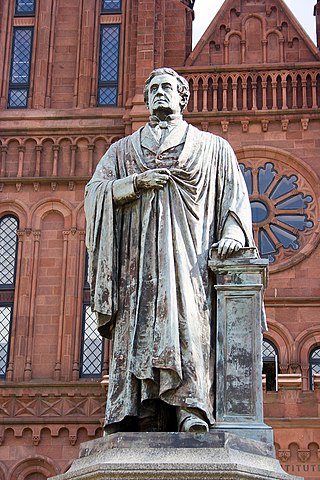
Professor Joseph Henry, also known as the Joseph Henry Memorial, is an outdoor bronze sculpture depicting scientist Joseph Henry, the first president of the Smithsonian Institution. The statue stands in front of the Smithsonian Institution Building in Washington, D.C., facing the National Mall. It was sculpted by artist William Wetmore Story, and dedicated in 1883, a few years after Henry's death. The bronze statue and granite base were unveiled in front of thousands of onlookers and invited guests. Speeches at the dedication included one from Chief Justice of the Supreme Court Morrison Waite, and the president of Yale College, Noah Porter.

An agricultural drone is an unmanned aerial vehicle used in agriculture operations, mostly in yield optimization and in monitoring crop growth and crop production. Agricultural drones provide information on crop growth stages, crop health, and soil variations. Multispectral sensors are used on agricultural drones to image electromagnetic radiation beyond the visible spectrum, including near-infrared and short-wave infrared.
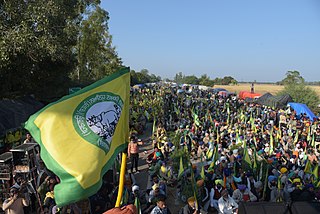
The 2020–2021 Indian farmers' protest was a protest against three farm acts that were passed by the Parliament of India in September 2020. The acts, often called the Farm Bills, had been described as "anti-farmer laws" by many farmer unions, and politicians from the opposition who said that it would leave farmers at the "mercy of corporates" since the farmer-trader disputes were taken to SDM instead of judiciary. The protests demanded the creation of a minimum support price (MSP) bill, to ensure that corporates cannot control the prices. The Union Government, however, maintained that the laws would make it effortless for farmers to sell their produce directly to big buyers, and stated that the protests are based on misinformation. Related endemic legacy issues include farmer suicides and low farmer incomes. Despite India being largely self-sufficient in foodgrain production and having welfare schemes, hunger and nutrition remain serious issues, with India ranking as one of the worst countries in the world in food security parameters. Due to unfulfilled previous demands 2024 Indian farmers' protest started on 13 of February 2024.
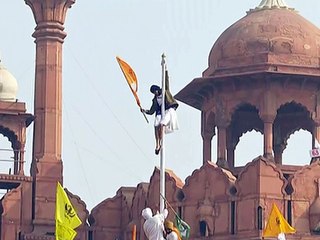
The 2021 Farmers' Republic Day protest was a protest on 26 January 2021 at Delhi. Part of the 2020–2021 Indian farmers' protest. The protestors deviated from the parade to take the parade towards Red Fort. The protest took place on the 72nd Republic Day against the decision by Narendra Modi-led National Democratic Alliance (NDA) to implement three farm acts.
Wayne Cryts is a former Missouri farmer who protested against American grain elevator bankruptcy law in the early 1980s.
References
- ↑ James P. Hertzog (February 7, 1979). "DC Farm Protestors Facing Fiscal Drought". The Pittsburgh Post Gazette.
- 1 2 Brasch, Sam (February 5, 2014). "When Tractors Invaded D.C." Modern Farmer. Retrieved 5 February 2014.
- ↑ "D.C. Police Corral Farmers and Tractors". Jofreeman.com. Retrieved 2013-11-06.
- ↑ Roby, Marguerite (1979-02-05). "Tractorcade | Smithsonian Institution Archives". Siarchives.si.edu. Retrieved 2013-11-06.
- ↑ Spencer, Duncan (9 February 1979). "Farm Protest Costs Near $1 Million, Mall Sod Ruined". Washington Evening Star.